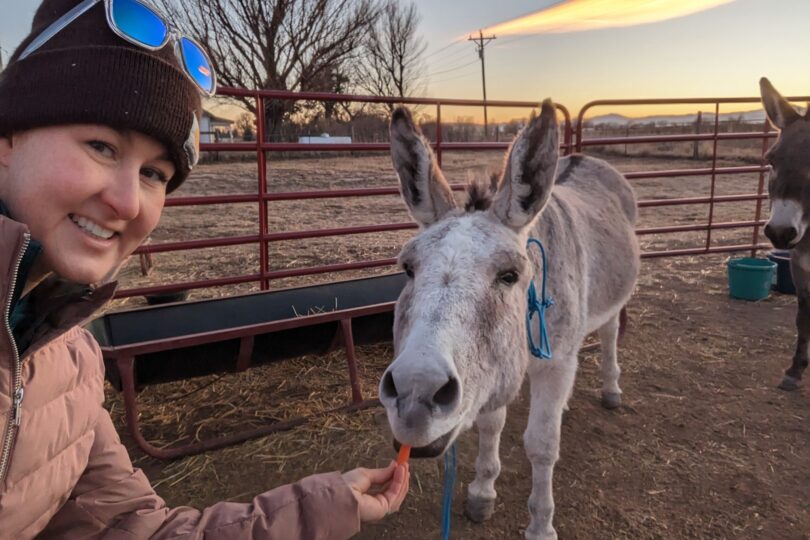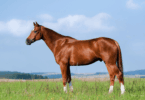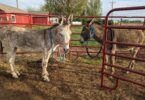Tried & True Tips for Feeding Treats to Wild Burros
Donkeys are incredibly intelligent animals. To work with them successfully, you need to earn their trust. This is not an easy thing to do—building trust, especially with a formerly wild animal, takes a lot of time and patience! Treats also help.
Positive reinforcement is the cornerstone of donkey training.
We’ll cover six of our favorite donkey-approved treats, along with a few that didn’t go over so well.
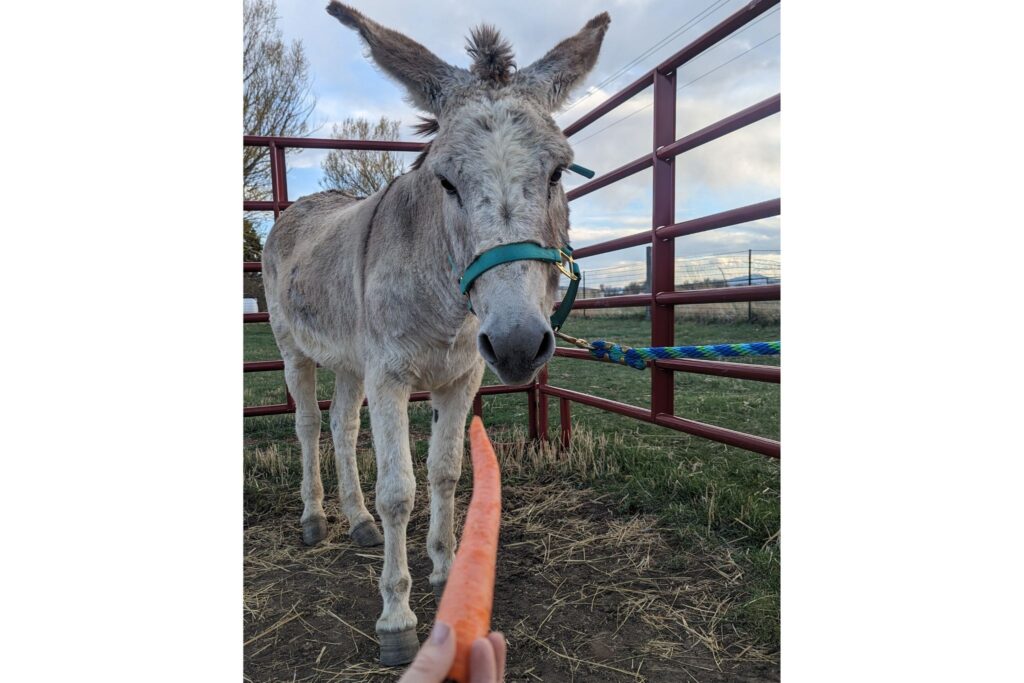
Source: Bottomless Backpacks
When considering what treats to feed your burro, think about the following:
Safety for Equines: Treats should be safe to feed to donkeys – generally, things formulated for equines are OK, but be aware of sugar content!
Nutrition: As donkeys are prone to obesity, treats should be low calorie and low sugar. A good rule of thumb is to feed a donkey as you would a horse with a metabolic condition.
For more info about donkey nutrition, check out this article.
Speed: You want to be able to quickly provide a treat in response to a specific good behavior to ensure your donkey associates what they did with the reward.
Some treats are more conducive to fast feeding than others!
Our donkeys in particular started out taking treats with their teeth, not their lips, earning the nickname “piranhas.” After a few finger nips, I quickly learned what treats (and treat shapes!) were best for our training sessions.
Convenience: You’ll need something to hold your treats so you have easy access to a quick reward. During colder months, I have an abundance of pockets, but during the summer a pouch to hold treats was essential.
Fanny packs are excellent donkey treat dispensers!
Preference: All logic aside, donkeys will like what they like. If they don’t want to eat it, it’s not going to make for a good treat. Honestly, trial and error can be fun!
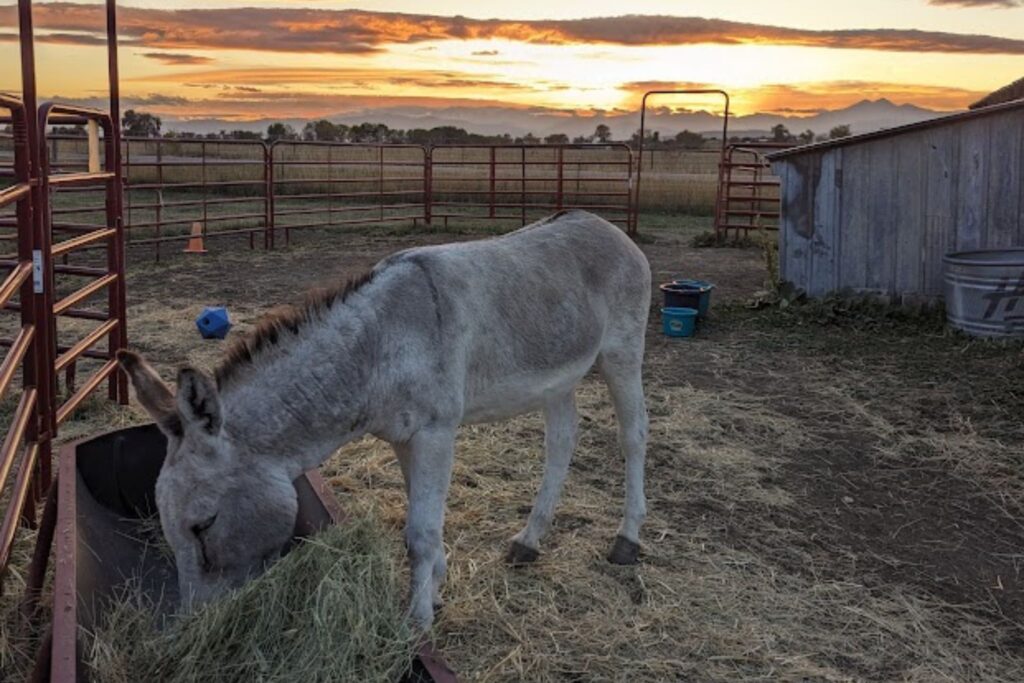
Six Top Treats for Donkeys
*always feed in moderation
#1: Carrots
Carrots* are by far the treat of choice for Blue and Moon. As an added bonus, carrots are relatively inexpensive and low calorie. During intense training weeks, it wasn’t uncommon to go through 8-10 lbs of carrots per week, at a cost of about $8.
Safety Tip:
There was a learning curve to carrots, though, which unfortunately took a few finger injuries to figure out!
Growing up around horses “Hold your hand flat when feeding treats to avoid getting bitten!” was drilled into my head.
I do NOT suggest this when feeding (wild) donkeys!
I held my hand flat feeding Moon a carrot piece early on in our training process and he took a big chunk out of my finger. Our donkeys started taking treats with their teeth; over time, they’ve learned to grab cookies with their lips, which is much gentler, but we still have to be careful when feeding them.
Blue also got me once—instead of holding my hand flat, I had a carrot pinched in between my thumb and index finger. He grabbed my fingers along with the carrot.
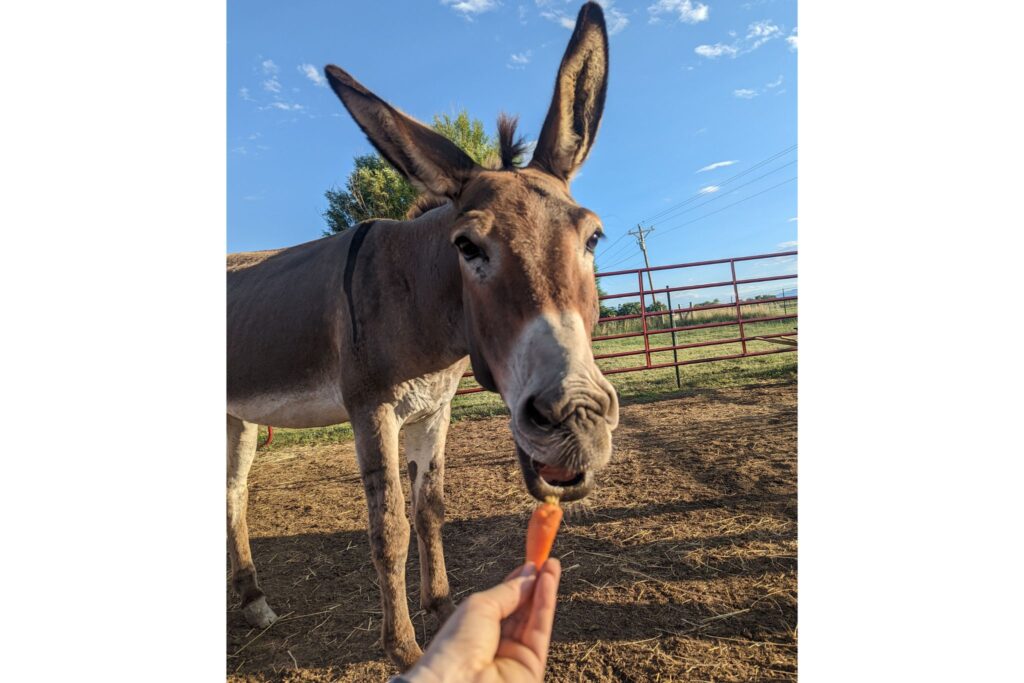
As a result of these two experiences, I’ve modified my carrot-feeding strategies. Instead of cutting carrots into small chunks, I cut them into long, skinny pieces. This allows me to hold the tip and quickly feed them without my fingers in the way.
If I end up with a smaller piece, I toss those on the ground or in the feed pan to keep my fingers safe.
Did I mention donkeys have VERY strong jaws? You definitely want to keep fingers clear!
*This is just what has worked for me!
#2: Steam Rolled Oats
While oats aren’t nearly as desirable as carrots, they still fall in the “treat” category. Oats are very close nutritionally to what a donkey might munch on in the wild. They’re the “fruit” of grasses that these burros normally graze on.
Oats are also super tiny, which can make them difficult to feed. After some painful encounters with carrots, I was nervous to try to hand-feed my donkeys oats. However, I was pleasantly surprised.
Their small size actually helped teach my donkeys how to take treats gently. The donkeys have to use their lips to grasp the oats. After a few days of treat-training with oats, we were consistently taking treats more gently.
The downside? Hand-feeding oats does make a bit of a mess.
Expect 25% or more of what you feed to end up on the ground!
#3: Beet Pulp
Shredded beet pulp is one of our favorite snacks. Over the winter months, I soak it in hot water to make the boys a warm snack. In the summer, I still soak it,* but now I use it as a training tool instead of just a snack. It’s a great source of fiber and takes them a bit longer to eat, which gives me plenty of time for training!
*ALWAYS soak beet pulp! Beet pulp expands a lot as it absorbs moisture. If you feed it dry, you risk it expanding in the donkey’s intestines, which could cause a blockage. Blockages can cause impaction colic.
I’ve found that just 5-10 minutes is plenty of time to soak shredded beet pulp.
Beet pulp can come in shredded or pelleted form. I prefer shredded—it requires less soaking time. Pellets are OK, but be sure to add extra time so they have fully absorbed water enough water to avoid any issues.
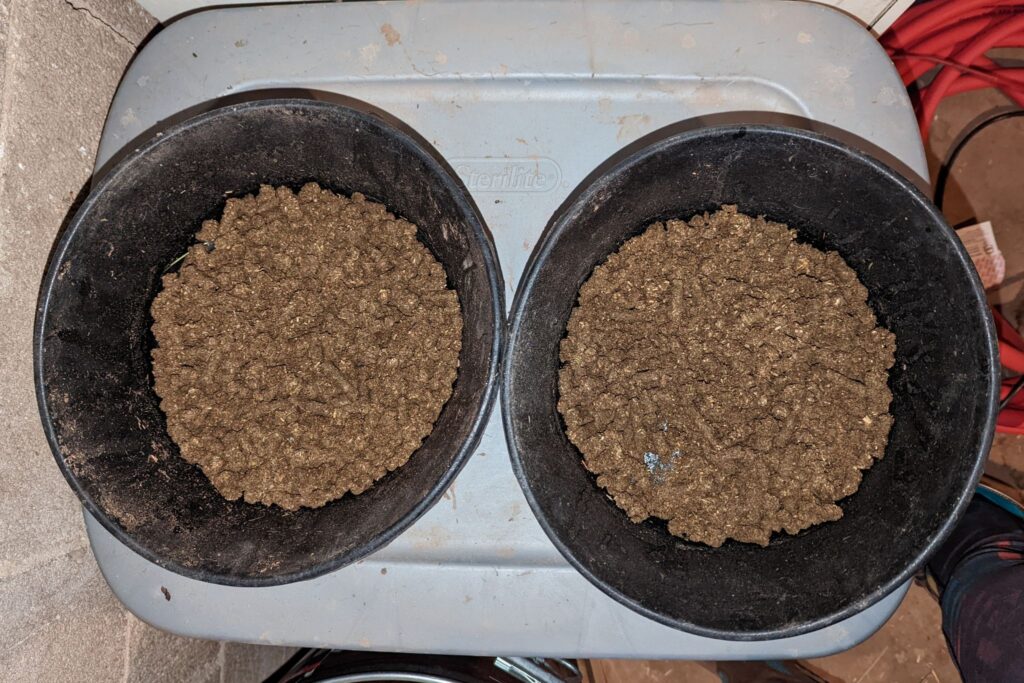
Soaked pellets
Shreds are “fluffier” than pellets, so pellets are likely a better value. Shreds come in a 25 lb bag, while pellets come in a 40 lb bag. The pricing used to be similar ($16.99 / bag) but the pellets have gotten more expensive over the last six months. A bag of pellets in March 2023 was $19.49 at Tractor Supply.
Additionally, you need to look for beet pulp without added molasses. Remember, donkeys are prone to obesity—you don’t want to feed anything with added sugar.
Did you know beets are grown for their sugar? Then how can they make a good donkey treat?
Beets are processed to remove the sugar, which is then used for other things. What’s left is a low sugar, high fiber product that is great for donkeys.
Some manufacturers will add molasses back to the beet pulp to make it more appealing to horses. While this is fine for horses, beet pulp with added molasses will be too sweet for donkeys.
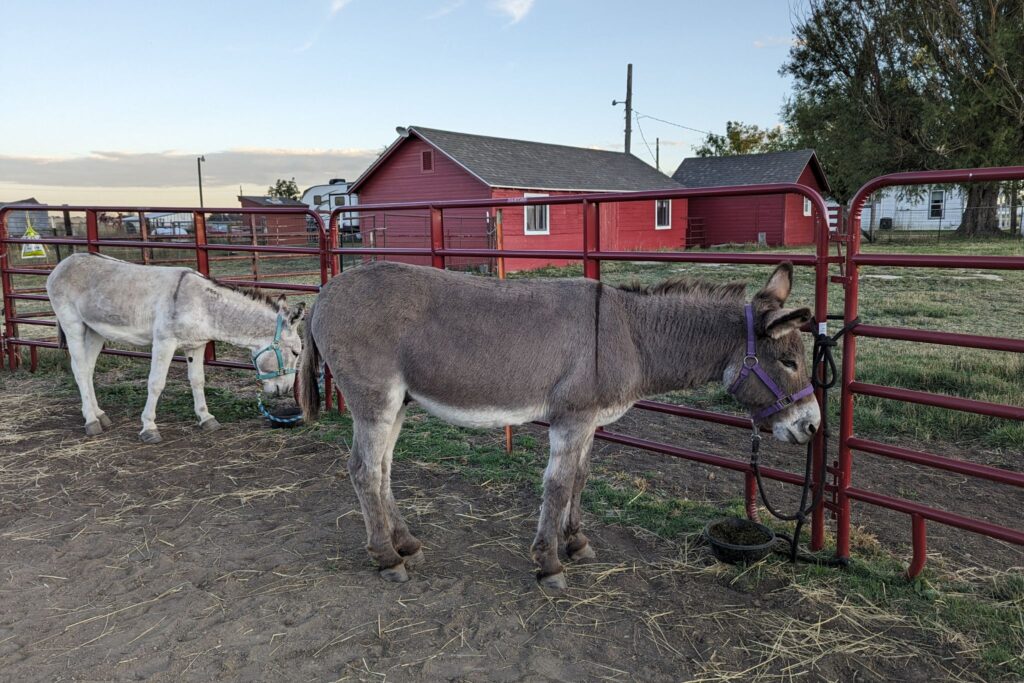
Blue and Einstein enjoying a warm beet pulp mash in the winter
#3: Grain
Grain can be a great high-value reward or incentive to get your donkey to do something. We use grain for the hard stuff—like picking up feet for the first time or loading in the trailer.
Grain should be used sparingly. Many donkeys don’t require any grain at all in their diets.
It is a concentrated source of calories, so feed wisely!
I’ve found two grains that work very well with our donkeys:
SafeChoice Special Care: This product is formulated for horses with metabolic conditions, so it is low in sugar and lower calorie than a normal equine grain. That said, it is pelleted, so it is a denser source of calories than feeding something “fluffier” like beet pulp.
I only feed about 0.5 lbs per day per donkey, or half a scoop.
An added bonus to this option? It has pre-and-probiotics added for gut health, along with added biotin for their hooves and vitamins and minerals formulated for equine needs. It also has essential amino acids, balanced for equines, which can help develop better muscle along the topline.
Safe Choice Special Care is more concentrated than the second option, so if you opt to feed it, be sure to stick to very low amounts.
Total Equine LNSC: This feed is also formulated for insulin-resistant horses, making it low-sugar and low-calorie.
(LNSC=Lower non-structural carbohydrate) Unlike SafeChoice Special Care, which is pelleted, Total Equine is extruded (a different manufacturing process) which makes it “fluffier.”
Extruded products are nice because you can feed a higher volume of it (for context, I can feed one full scoop per donkey per day of this product vs. 0.5 scoops of the pellets listed above). However, that does make it more expensive than alternatives.
This product does not have added biotin or pre/probiotics.
While we love this, it is expensive! As of October 2024, a 40# bag is between $32-41, compared to SafeChoice Special Care (50 lbs) at $25.
#4: Animal Crackers
The non-frosted variety of animal crackers can make for a good horse treat. They’re shelf stable and relatively inexpensive.
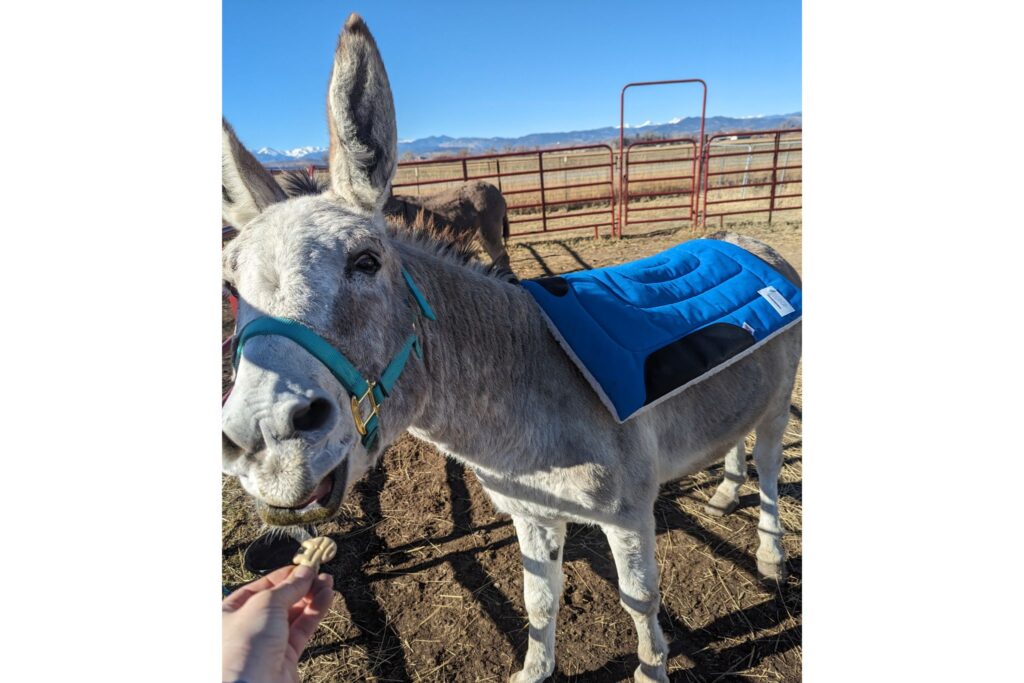
Be careful when feeding, as the smaller size may be a bit of a safety hazard when it comes to fingers.
Our donkeys like these, but if given the choice, would probably choose a carrot.
Another plus? I don’t mind snacking on them, either!
Depending on where you buy them, they come in a reusable, mouse-proof container.
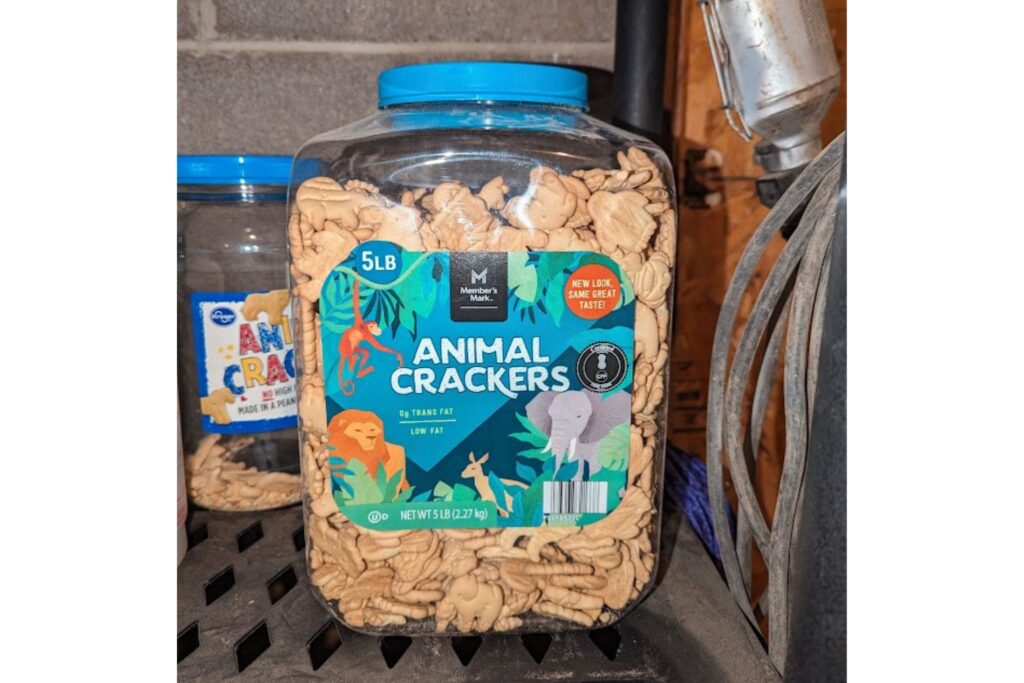
Mouse-proof container (NOT raccoon-proof) from Sam’s Club
#5: Watermelon
Watermelon is a great summer snack for both people and donkeys!
You can feed your donkeys the rinds—they’re a great source of fiber and (not shockingly) water. Our donkeys are a little spoiled and won’t eat just the rind—they like the red part, too. I cut up bite-size pieces and include these in our treat rotation.
They do max out on watermelon, so we feed it in moderation to mix things up and then switch back to carrots.
Tried it, Didn’t Love It List
#1: Zucchini
Zucchini and squash are safe to feed to donkeys. Unfortunately, ours aren’t really big fans. Moon ate a few pieces and then refused it. Blue will eat it but still prefers carrots. It was a fun way to mix things up and worth a try!
#2: Strawberries
Strawberries were fun, but again, not a fan favorite. We ate a few, then switched back to carrots.
Caution: Never feed moldy or rotting fruit to your donkeys
#3: Applesauce
I tried some no-sugar-added applesauce, thinking it would be a good way to get meds in our boys later if needed.
Unfortunately, we thought applesauce was weird and were not very enthusiastic about it.
I did leave it in a feed pan overnight, and by morning the next day, it was gone. So eventually, someone ate it! But I don’t think they liked it enough to sneak any medications into it in the near future.
Parting Thoughts
There are a lot of different treats out there to try. Watching the donkeys try something new and evaluate it can be very entertaining! Just be sure you’re offering treats that are safe for your burro. If you’re not sure, check with your vet!
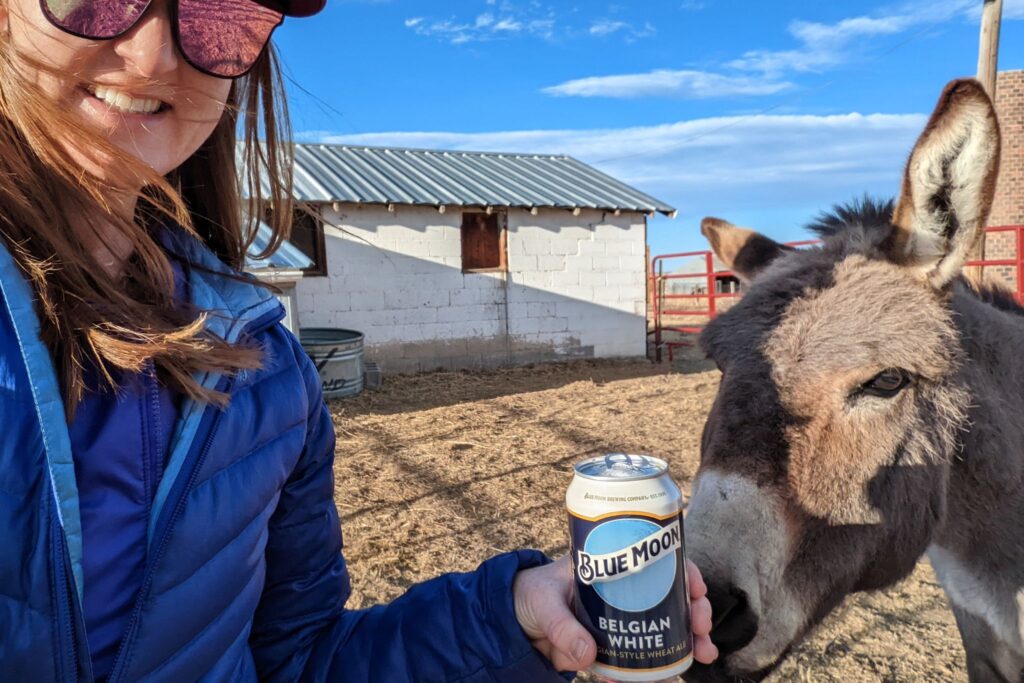
And last but not least…Don’t forget to reward yourself with human treats!
P.S. Enjoy this article? Trot on over to:
- How to Adopt a Wild Donkey: A Helpful Beginner’s Guide
- Owning Donkeys for Beginners (Pros, Cons, What to Expect)
- Donkeys and Horses: Better Together or Bad Roommates?
- Donkey vs. horse nutrition: What’s the difference?
- Do Donkeys Bite? (And How to Keep Your Fingers!)
- 5 Simple Steps to Halter Training Your Wild Donkey
- Safety First: How Much Can a Donkey Carry?

